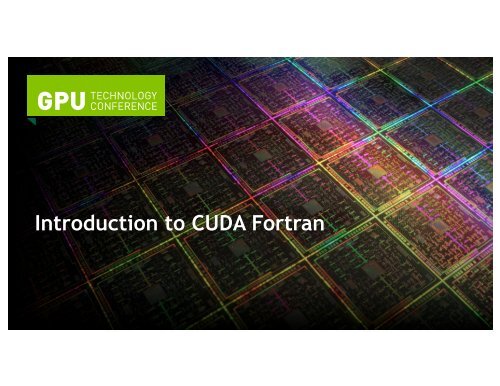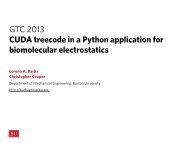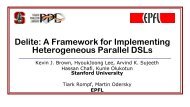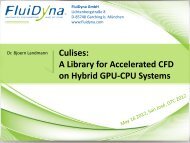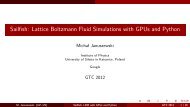Tutorial: Introduction to CUDA Fortran | GTC 2013
Tutorial: Introduction to CUDA Fortran | GTC 2013
Tutorial: Introduction to CUDA Fortran | GTC 2013
You also want an ePaper? Increase the reach of your titles
YUMPU automatically turns print PDFs into web optimized ePapers that Google loves.
<strong>Introduction</strong> <strong>to</strong> <strong>CUDA</strong> <strong>Fortran</strong>
Outline<br />
• <strong>Introduction</strong><br />
– Basic Concepts<br />
– Simple Examples<br />
– Kernel Loop Directives (CUF Kernels)<br />
– Compute Capabilities<br />
– Compilation<br />
• Performance Optimization<br />
• Examples<br />
• Multi-GPU Programming
<strong>Introduction</strong><br />
• <strong>CUDA</strong> is a scalable model for parallel computing<br />
• <strong>CUDA</strong> <strong>Fortran</strong> is the <strong>Fortran</strong> analog <strong>to</strong> <strong>CUDA</strong> C<br />
– Program has host and device code similar <strong>to</strong> <strong>CUDA</strong> C<br />
– Host code is based on the runtime API<br />
– <strong>Fortran</strong> language extensions <strong>to</strong> simplify data management<br />
• Co-defined by NVIDIA and PGI, implemented in the PGI <strong>Fortran</strong><br />
compiler
<strong>CUDA</strong> Programming<br />
• Heterogeneous programming model<br />
– CPU and GPU are separate devices with separate memory spaces<br />
– Host code runs on the CPU<br />
• Handles data management for both host and device<br />
• Launches kernels which are subroutines executed on the GPU<br />
– Device code runs on the GPU<br />
• Executed by many GPU threads in parallel<br />
– Allows for incremental development
Heterogeneous Programming<br />
• Host = CPU and its memory<br />
• Device = GPU and its memory<br />
Host<br />
Device<br />
• Typical code progression<br />
– Allocate memory on host and device<br />
– Transfer data from host <strong>to</strong> device<br />
– Execute kernel (device computation)<br />
CPU<br />
DRAM<br />
PCIe<br />
GPU<br />
DRAM<br />
– Transfer result from device <strong>to</strong> host<br />
– Deallocate memory
Data Transfers<br />
program copyData<br />
use cudafor<br />
implicit none<br />
integer, parameter :: n = 256<br />
real :: a(n), b(n)<br />
real, device :: a_d(n), b_d(n)<br />
a = 1.0<br />
a_d = a<br />
b_d = a_d<br />
b = b_d<br />
if (all(a == b)) &<br />
write(*,*) 'Test Passed'<br />
end program copyData<br />
Host<br />
CPU<br />
DRAM<br />
a<br />
b<br />
Device<br />
GPU<br />
DRAM<br />
a_d<br />
b_d
Data Transfers<br />
program copyData<br />
use cudafor<br />
implicit none<br />
integer, parameter :: n = 256<br />
real :: a(n), b(n)<br />
real, device :: a_d(n), b_d(n)<br />
a = 1.0<br />
a_d = a<br />
b_d = a_d<br />
b = b_d<br />
if (all(a == b)) &<br />
write(*,*) 'Test Passed'<br />
end program copyData<br />
Host<br />
CPU<br />
DRAM<br />
a<br />
b<br />
Device<br />
GPU<br />
DRAM<br />
a_d<br />
b_d
Data Transfers<br />
program copyData<br />
use cudafor<br />
implicit none<br />
integer, parameter :: n = 256<br />
real :: a(n), b(n)<br />
real, device :: a_d(n), b_d(n)<br />
a = 1.0<br />
a_d = a<br />
b_d = a_d<br />
b = b_d<br />
Host<br />
CPU<br />
DRAM<br />
a<br />
b<br />
PCIe<br />
Device<br />
GPU<br />
DRAM<br />
a_d<br />
b_d<br />
if (all(a == b)) &<br />
write(*,*) 'Test Passed'<br />
end program copyData
Data Transfers<br />
program copyData<br />
use cudafor<br />
implicit none<br />
integer, parameter :: n = 256<br />
real :: a(n), b(n)<br />
real, device :: a_d(n), b_d(n)<br />
a = 1.0<br />
a_d = a<br />
b_d = a_d<br />
b = b_d<br />
if (all(a == b)) &<br />
write(*,*) 'Test Passed'<br />
end program copyData<br />
Host<br />
CPU<br />
DRAM<br />
a<br />
b<br />
Device<br />
GPU<br />
DRAM<br />
a_d<br />
b_d
Data Transfers<br />
program copyData<br />
use cudafor<br />
implicit none<br />
integer, parameter :: n = 256<br />
real :: a(n), b(n)<br />
real, device :: a_d(n), b_d(n)<br />
a = 1.0<br />
a_d = a<br />
b_d = a_d<br />
b = b_d<br />
Host<br />
CPU<br />
DRAM<br />
a<br />
b<br />
PCIe<br />
Device<br />
GPU<br />
DRAM<br />
a_d<br />
b_d<br />
if (all(a == b)) &<br />
write(*,*) 'Test Passed'<br />
end program copyData
F90 Array Increment<br />
module simpleOps_m<br />
contains<br />
subroutine inc(a, b)<br />
implicit none<br />
integer :: a(:)<br />
integer :: b<br />
integer :: i, n<br />
n = size(a)<br />
do i = 1, n<br />
a(i) = a(i)+b<br />
enddo<br />
end subroutine inc<br />
end module simpleOps_m<br />
program incTest<br />
use simpleOps_m<br />
implicit none<br />
integer :: b, n = 256<br />
integer, allocatable:: a(:)<br />
allocate (a(n))<br />
a = 1 ! array assignment<br />
b = 3<br />
call inc(a, b)<br />
if (all(a == 4)) &<br />
write(*,*) 'Test Passed'<br />
deallocate(a)<br />
end program incTest
<strong>CUDA</strong> <strong>Fortran</strong> - Host Code<br />
F90<br />
program incTest<br />
use simpleOps_m<br />
implicit none<br />
integer :: b, n = 256<br />
integer, allocatable:: a(:)<br />
allocate (a(n))<br />
a = 1 ! array assignment<br />
b = 3<br />
call inc(a, b)<br />
if (all(a == 4)) &<br />
write(*,*) 'Test Passed'<br />
deallocate(a)<br />
end program incTest<br />
<strong>CUDA</strong> <strong>Fortran</strong><br />
program incTest<br />
use cudafor<br />
use simpleOps_m<br />
implicit none<br />
integer :: b, n = 256<br />
integer, allocatable :: a(:)<br />
integer, allocatable, device :: a_d(:)<br />
allocate (a(n),a_d(n))<br />
a = 1<br />
b = 3<br />
a_d = a<br />
call inc(a_d, b)<br />
a = a_d<br />
if (all(a == 4)) &<br />
write(*,*) 'Test Passed'<br />
deallocate (a,a_d)<br />
end program incTest
<strong>CUDA</strong> <strong>Fortran</strong> - Device Code<br />
F90<br />
module simpleOps_m<br />
contains<br />
subroutine inc(a, b)<br />
implicit none<br />
integer :: a(:)<br />
integer :: b<br />
integer :: i, n<br />
n = size(a)<br />
do i = 1, n<br />
a(i) = a(i)+b<br />
enddo<br />
end subroutine inc<br />
end module simpleOps_m<br />
<strong>CUDA</strong> <strong>Fortran</strong><br />
module simpleOps_m<br />
contains<br />
attributes(global) subroutine inc(a, b)<br />
implicit none<br />
integer :: a(:)<br />
integer, value :: b<br />
integer :: i<br />
i = threadIdx%x<br />
a(i) = a(i)+b<br />
end subroutine inc<br />
end module simpleOps_m
Extending <strong>to</strong> Larger Arrays<br />
• Previous example works with small arrays<br />
call inc(a_d,b)<br />
– Limit of n=1024 (Fermi) or n=512 (pre-Fermi)<br />
• For larger arrays, change the first execution parameter<br />
()
Execution Model<br />
Software<br />
Thread<br />
Thread<br />
Block<br />
Hardware<br />
Thread<br />
Processor<br />
Multiprocessor<br />
Threads are executed by thread<br />
processors<br />
Thread blocks are executed on<br />
multiprocessors<br />
Thread blocks do not migrate<br />
Several concurrent thread blocks can reside<br />
on a multiprocessor<br />
...<br />
A kernel is launched on a device as a<br />
grid of thread blocks<br />
Grid<br />
Device
Execution Configuration<br />
• Execution configuration specified in host code<br />
call inc(a_d,b)<br />
• Previous example used a single thread block<br />
• Multiple thread blocks<br />
call inc(a_d,b)<br />
tPB = 256<br />
call inc(a_d,b)
Mapping Arrays <strong>to</strong> Thread Blocks<br />
• call inc(a_d, b)<br />
blockDim%x = 4<br />
blockIdx%x<br />
1<br />
2<br />
3<br />
threadIdx%x<br />
1 2 3 4<br />
1 2 3 4<br />
1 2 3 4<br />
(blockIdx%x-1)*blockDim%x<br />
+ threadIdx%x<br />
1 2 3 4<br />
5 6 7 8<br />
9 10 11 12
Large Array - Host Code<br />
program incTest<br />
use cudafor<br />
use simpleOps_m<br />
implicit none<br />
integer, parameter :: n = 1024*1024<br />
integer, parameter :: tPB = 256<br />
integer :: a(n), b<br />
integer, device :: a_d(n)<br />
a = 1<br />
b = 3<br />
a_d = a<br />
call inc(a_d, b)<br />
a = a_d<br />
if (all(a == 4)) then<br />
write(*,*) 'Success'<br />
endif<br />
end program incTest
Built-in Variables for Device Code<br />
• Predefined variables in device subroutines<br />
– Grid and block dimensions - gridDim, blockDim<br />
– Block and thread indices - blockIdx, threadIdx<br />
– Of type dim3<br />
type (dim3)<br />
integer (kind=4) :: x, y, z<br />
end type<br />
– blockIdx and threadIdx fields have unit offset<br />
1
Large Array - Device Code<br />
module simpleOps_m<br />
contains<br />
attributes(global) subroutine inc(a, b)<br />
implicit none<br />
integer :: a(:)<br />
integer, value :: b<br />
integer :: i, n<br />
i = (blockIdx%x-1)*blockDim%x + threadIdx%x<br />
n = size(a)<br />
if (i
Multidimensional Example - Host<br />
• Execution Configuration<br />
call inc(a_d,b)<br />
– Grid dimensions in blocks (blocksPerGrid) and block dimensions in<br />
threads (threadsPerBlock) can be either integer or dim3<br />
type (dim3)<br />
integer (kind=4) :: x, y, z<br />
end type
2D Example - Host Code<br />
program incTest<br />
use cudafor<br />
use simpleOps_m<br />
implicit none<br />
integer, parameter :: nx=1024, ny=512<br />
real :: a(nx,ny), b<br />
real, device :: a_d(nx,ny)<br />
type(dim3) :: grid, tBlock<br />
a = 1; b = 3<br />
tBlock = dim3(32,8,1)<br />
grid = dim3(ceiling(real(nx)/tBlock%x), ceiling(real(ny)/tBlock%y), 1)<br />
a_d = a<br />
call inc(a_d, b)<br />
a = a_d<br />
write(*,*) 'Max error: ', maxval(abs(a-4))<br />
end program incTest
2D Example - Device Code<br />
module simpleOps_m<br />
contains<br />
attributes(global) subroutine inc(a, b)<br />
implicit none<br />
real :: a(:,:)<br />
real, value :: b<br />
integer :: i, j<br />
i = (blockIdx%x-1)*blockDim%x + threadIdx%x<br />
j = (blockIdx%y-1)*blockDim%y + threadIdx%y<br />
if (i
Outline<br />
• <strong>Introduction</strong><br />
– Basic Concepts<br />
– Simple Examples<br />
– Kernel Loop Directives (CUF Kernels)<br />
– Compute Capabilities<br />
– Compilation<br />
• Performance Optimization<br />
• Examples<br />
• Multi-GPU Programming
Kernel Loop Directives (CUF Kernels)<br />
• Au<strong>to</strong>matic kernel generation and invocation of host code<br />
region (arrays in loops must reside on GPU)<br />
program incTest<br />
use cudafor<br />
implicit none<br />
integer, parameter :: n = 256<br />
integer :: a(n), b<br />
integer, device :: a_d(n)<br />
a = 1; b = 3; a_d = a<br />
!$cuf kernel <br />
do i = 1, n<br />
a_d(i) = a_d(i)+b<br />
enddo<br />
a = a_d<br />
if (all(a == 4)) write(*,*) 'Test Passed'<br />
end program incTest
Kernel Loop Directives (CUF Kernels)<br />
• Multidimensional arrays<br />
!$cuf kernel do(2) ><br />
do j = 1, ny<br />
do i = 1, nx<br />
a_d(i,j) = b_d(i,j) + c_d(i,j)<br />
enddo<br />
enddo<br />
• Can specify parts of execution parameter<br />
!$cuf kernel do(2)
Reduction using CUF Kernels<br />
• Compiler recognizes use of scalar reduction and generates one<br />
result<br />
rsum = 0.0<br />
!$cuf kernel do <br />
do i = 1, nx<br />
rsum = rsum + a_d(i)<br />
enddo
Compute Capabilities<br />
Architecture<br />
Tesla<br />
Fermi<br />
Kepler<br />
Compute capabilities 1.0 1.1 1.2 1.3 2.0 2.1 3.0 3.5<br />
Double precision<br />
3D grids<br />
Max # threads per block 512 1024<br />
Shared memory per MP<br />
16Kb<br />
48Kb<br />
(16/48,48/16)<br />
48Kb<br />
+(32/32)<br />
..... ..... ... ...<br />
• All these values are returned by cudaGetDeviceProperties<br />
• Target GPU can be specified with -Mcuda=ccxy
Compilation<br />
• pgfortran - PGI’s <strong>Fortran</strong> compiler<br />
– All source code with .cuf or .CUF is compiled as <strong>CUDA</strong> <strong>Fortran</strong> enabled<br />
au<strong>to</strong>matically<br />
– Flag <strong>to</strong> target architecture (eg. -Mcuda=cc35)<br />
– -Mcuda=emu specifies emulation mode<br />
– Flag <strong>to</strong> target <strong>CUDA</strong> Toolkit version (eg. -Mcuda=cuda5.0)<br />
– -Mcuda=fastmath enables faster intrinsics (__sinf())<br />
– -Mcuda=nofma turns off fused multiply-add<br />
– -Mcuda=maxregcount: limits register usage per thread<br />
– -Mcuda=ptxinfo prints memory usage per kernel<br />
• pgfortran -Mcuda -help for a full list
Separate Compilation<br />
• Device data can be shared between modules via F90 use<br />
– No special compilation flags needed<br />
• Device functions called between modules requires compilation<br />
with -Mcuda=rdc<br />
– rdc = relocatable device code<br />
– Device must be cc20 or higher (Fermi and Kepler)<br />
– Use on compile and link lines<br />
– -Mcuda=rdc implies -Mcuda=cuda5.0 and CC >= 2.0<br />
– requires 13.3 compiler
Separate Compilation<br />
module kernel_m<br />
contains<br />
attributes(global) subroutine difference(a,b)<br />
use devFunc_m<br />
integer :: a, b, c<br />
c = b<br />
call negate(c)<br />
a = a+c<br />
end subroutine difference<br />
end module kernel_m<br />
$ pgf90 -Mcuda=rdc -c devFunc.cuf<br />
$ pgf90 -Mcuda=rdc -c kernel.cuf<br />
$ pgf90 -Mcuda=rdc aMinusB.cuf devFunc.o kernel.o<br />
module devFunc_m<br />
contains<br />
attributes(device) subroutine negate(a)<br />
integer :: a<br />
a = -a<br />
end subroutine negate<br />
end module devFunc_m<br />
program aMinusB<br />
use kernel_m<br />
integer :: a<br />
integer, device :: a_d, b_d<br />
a_d = 2; b_d = 3<br />
call difference(a_d, b_d)<br />
a = a_d<br />
write(*,"('2-3=',i0)") a<br />
end program aMinusB
Outline<br />
• <strong>Introduction</strong><br />
• Performance Optimization<br />
– Host-Device Data Transfers<br />
– Device Memory<br />
– Execution Configuration<br />
• Examples<br />
• Multi-GPU Programming
Host-Device Transfers<br />
• Host-device bandwidth is much lower than bandwidth within<br />
device<br />
– 8 GB/s peak (PCIe x16 Gen 2) vs. 250 GB/s peak (Tesla K20X)<br />
• Minimize number of transfers<br />
– Intermediate data can be allocated, used, and deallocated without<br />
copying <strong>to</strong> host memory<br />
– Sometimes better <strong>to</strong> do low parallelism operations on the GPU if it<br />
avoids transfers <strong>to</strong> and from host
Page-Locked Data Transfers<br />
Pageable Data Transfer<br />
Device<br />
DRAM<br />
Page-locked Data Transfer<br />
Device<br />
DRAM<br />
Host<br />
Host<br />
Pageable<br />
memory<br />
Pinned<br />
buffer<br />
Pinned<br />
memory
Page-Locked Data Transfers<br />
• Page-locked or pinned host memory by declaration<br />
– Designated by pinned variable attribute<br />
– Must be allocatable<br />
real, device :: a_d(N)<br />
real, pinned, allocatable :: a(:)<br />
allocate(a(N), STAT=istat, PINNED=pinnedFlag)<br />
...<br />
a_d = a<br />
– Tesla K20/Sandy Bridge<br />
• Pageable: ~3.3 GB/s<br />
• Pinned: ~6 GB/s
Overlapping Transfers and Computation<br />
• Kernel launches are asynchronous, normal memory copies are<br />
blocking<br />
a_d = a ! blocks on host until transfer completes<br />
call inc(a_d, b) ! Control returns immediately <strong>to</strong> CPU<br />
a = a_d ! starts only after kernel completes<br />
• Asynchronous and Stream APIs allow overlap of transfers with<br />
computation<br />
• A stream is a sequence of operations that execute in order on<br />
the GPU<br />
– Operations in different (non-default) streams can be interleaved<br />
– Stream ID used as arguments <strong>to</strong> async transfers and kernel launches
Asynchronous Data Transfers<br />
• Asynchronous host-device transfers return control immediately<br />
<strong>to</strong> CPU<br />
– cudaMemcpyAsync(dst, src, nElements, stream)<br />
– Requires pinned host memory<br />
• Overlapping data transfer with CPU computation<br />
– default stream = 0<br />
istat = cudaMemcpyAsync(a_d, a_h, N, 0)<br />
call kernel(a_d)<br />
call cpuFunction(b)<br />
overlapped
Overlapping Transfers and Kernels<br />
• Requires:<br />
– Pinned host memory<br />
– Kernel and transfer <strong>to</strong> use different non-zero streams<br />
integer (kind=cuda_stream_kind) :: stream1, stream2<br />
...<br />
istat = cudaStreamCreate(stream1)<br />
istat = cudaStreamCreate(stream2)<br />
istat = cudaMemcpyAsync(a_d, a_h, N, stream1)<br />
call kernel(b_d)<br />
overlapped
GPU/CPU Synchronization<br />
• cudaDeviceSynchronize()<br />
– Blocks until all previously issued operations on the GPU complete<br />
• cudaStreamSynchronize(stream)<br />
– Blocks until all previously issued operations <strong>to</strong> stream complete<br />
• cudaStreamQuery(stream)<br />
– Indicates whether stream is idle<br />
– Does not block CPU code
GPU/CPU Synchronization<br />
• Stream-based using <strong>CUDA</strong> events<br />
– Events can be inserted in<strong>to</strong> streams<br />
type (cudaEvent) :: event<br />
...<br />
istat = cudaEventRecord(event, stream1)<br />
– Event is recorded when the GPU reaches it in the stream<br />
• Recorded = assigned a time stamp<br />
• Useful for timing code<br />
– cudaEventSynchronize(event)<br />
• Blocks CPU until event is recorded
Outline<br />
• <strong>Introduction</strong><br />
• Performance Optimization<br />
– Host-Device Data Transfers<br />
– Device Memory<br />
– Execution Configuration<br />
• Examples<br />
• Multi-GPU Programming
Coalescing<br />
• Device data accessed by a group of 16 or 32 sequential threads<br />
can result in as little as a single transaction if certain<br />
requirements are met<br />
– Alignment<br />
– Stride<br />
– Generation of GPU architecture
Misaligned Data Access<br />
• Use array increment kernel with variable misalignment<br />
attributes(global) subroutine offset(a, s)<br />
real :: a(*)<br />
integer, value :: s<br />
integer :: i<br />
i = blockDim%x*(blockIdx%x-1)+threadIdx%x + s<br />
a(i) = a(i)+1<br />
end subroutine offset<br />
Array a() allocated with padding <strong>to</strong> avoid out-of-bounds accesses
Misaligned Data Access
Strided Data Access<br />
• Use array increment kernel with variable stride<br />
attributes(global) subroutine stride(a, s)<br />
real :: a(*)<br />
integer,! value :: s<br />
integer :: i<br />
i = (blockDim%x*(blockIdx%x-1)+threadIdx%x) * s<br />
a(i) = a(i)+1 !<br />
end subroutine stride<br />
Array a() allocated with padding <strong>to</strong> avoid out-of-bounds accesses
Strided Data Access
Shared Memory<br />
• On-chip<br />
• All threads in a block have access <strong>to</strong> same shared memory<br />
• Used <strong>to</strong> reduce multiple loads of device data<br />
• Used <strong>to</strong> accommodate coalescing<br />
DRAM<br />
Shared<br />
Shared
Matrix Transpose<br />
attributes(global) subroutine transposeNaive(odata, idata)<br />
real, intent(out) :: odata(ny,nx)<br />
real, intent(in) :: idata(nx,ny)<br />
integer :: x, y<br />
x = (blockIdx%x-1) * blockDim%x + threadIdx%x<br />
y = (blockIdx%y-1) * blockDim%y + threadIdx%y<br />
odata(y,x) = idata(x,y)<br />
end subroutine transposeNaive<br />
idata<br />
odata
Matrix Transpose - Shared Memory<br />
attributes(global) subroutine transposeCoalesced(odata, idata)<br />
real, intent(out) :: odata(ny,nx)<br />
real, intent(in) :: idata(nx,ny)<br />
real, shared :: tile(TILE_DIM, TILE_DIM)<br />
integer :: x, y<br />
x = (blockIdx%x-1)*blockDim%x + threadIdx%x<br />
y = (blockIdx%y-1)*blockDim%y + threadIdx%y<br />
tile(threadIdx%x, threadIdx%y) = idata(x,y)<br />
call syncthreads()<br />
x = (blockIdx%y-1)*blockDim%y + threadIdx%x<br />
y = (blockIdx%x-1)*blockDim%x + threadIdx%y<br />
odata(x,y) = tile(threadIdx%y, threadIdx%x)<br />
end subroutine transposeCoalesced<br />
idata<br />
tile<br />
odata
Shared Memory Bank Conflicts<br />
• Shared memory is divided in<strong>to</strong> banks that can be accessed<br />
simultaneously<br />
• Successive 32-bit words are assigned <strong>to</strong> successive banks<br />
• Requests for different data in the same bank by threads in a<br />
warp (SIMD unit of 32 successive threads) are serialized<br />
• Common workaround is <strong>to</strong> pad shared memory arrays<br />
real, shared :: tile(TILE_DIM +1, TILE_DIM)
Textures<br />
• Different pathway for accessing data in device DRAM<br />
• Read-only by device code<br />
• Cached on chip in texture cache<br />
• Uses F90 pointer notation<br />
– Declare texture at module scope in module where used<br />
real, texture, pointer :: aTex(:)<br />
– Bind and unbind texture in host code using pointer notation<br />
• Equivalent <strong>to</strong> tex1Dfetch() in <strong>CUDA</strong> C<br />
– No filtering or wrapping modes<br />
• 12.8 and later compilers
Textures - Device Code<br />
module mymodule<br />
real, texture, pointer :: aTex(:)<br />
contains<br />
attributes(global) subroutine inc(b)<br />
real :: b(*)<br />
integer :: i<br />
i = blockDim%x*(blockIdx%x-1) + threadIdx%x<br />
b(i) = aTex(i)+1<br />
end subroutine<br />
end module
Textures - Host Code<br />
program tex<br />
use mymodule<br />
...<br />
real, device, target :: a_d(n)<br />
real, device :: b_d(n)<br />
! bind texture<br />
aTex => a_d<br />
call inc(b_d)<br />
...<br />
! unbind texture<br />
nullify(aTex)<br />
end program
Outline<br />
• <strong>Introduction</strong><br />
• Performance Optimization<br />
– Host-Device Data Transfers<br />
– Device Memory<br />
– Execution Configuration<br />
• Examples<br />
• Multi-GPU Programming
Execution Configuration<br />
• GPUs are high latency, 100s of cycles per device memory<br />
request<br />
• For good performance, you need <strong>to</strong> ensure there is enough<br />
parallelism <strong>to</strong> hide this latency<br />
• Such parallelism can come from:<br />
– Thread-level parallelism<br />
– Instruction-level parallelism
Thread-Level Parallelism<br />
• Execution configuration dictates number of threads per block<br />
– Limit on number of threads per block for each architecture<br />
• Number of concurrent blocks on a multiprocessor limited by<br />
– Register use per thread<br />
– Shared memory use per thread block<br />
– Limit on number of threads per multiprocessor<br />
• Occupancy<br />
– Ratio of actual <strong>to</strong> maximum number of concurrent threads per<br />
multiprocessor
Thread-Level Parallelism<br />
attributes(global) subroutine copy(odata, idata)<br />
real :: odata(*), idata(*), tmp<br />
integer :: i<br />
i = (blockIdx%x-1)*blockDim%x + threadIdx%x<br />
tmp = idata(i)<br />
odata(i) = tmp<br />
end subroutine copy
Thread-Level Parallelism<br />
• Run on K20<br />
– Maximum of 2048 concurrent threads per multiprocessor<br />
– Maximum of 16 concurrent blocks per multiprocessor<br />
– Maximum of 1024 threads per block<br />
Thread Block Size Occupancy Bandwidth (GB/s)<br />
32 0.25 96<br />
64 0.5 125<br />
128 1.0 136<br />
256 1.0 137<br />
512 1.0 137<br />
1024 1.0 133
Thread-Level Parallelism<br />
• Mimic high resource use<br />
– Specify enough shared memory so only one thread block can reside on<br />
a multiprocessor at a time<br />
ccall copy(b_d, a_d)<br />
No Shared Memory<br />
Shared Memory<br />
Thread Block Occupancy Bandwidth Occupancy Bandwidth<br />
32 0.25 96 0.016 8<br />
64 0.5 125 0.031 15<br />
128 1.0 136 0.063 29<br />
256 1.0 137 0.125 53<br />
512 1.0 137 0.25 91<br />
1024 1.0 133 0.5 123
Instruction-Level Parallelism<br />
• Have each thread process multiple elements<br />
attributes(global) subroutine copy_ILP(odata, idata)<br />
real :: odata(*), idata(*), tmp(ILP)<br />
integer :: i,j<br />
i = (blockIdx%x-1)*blockDim%x*ILP + threadIdx%x<br />
do j = 1, ILP<br />
tmp(j) = idata(i+(j-1)*blockDim%x)<br />
enddo<br />
do j = 1, ILP<br />
odata(i+(j-1)*blockDim%x) = tmp(j)<br />
enddo<br />
end subroutine copy_ILP
Instruction-Level Parallelism<br />
No Shared Memory<br />
Shared Memory<br />
Thread<br />
Block Size Occupancy Bandwidth Occupancy<br />
Bandwidth<br />
No ILP<br />
Bandwidth<br />
ILP = 4<br />
32 0.25 96 0.016 8 26<br />
64 0.5 125 0.031 15 50<br />
128 1.0 136 0.063 29 90<br />
256 1.0 137 0.125 53 125<br />
512 1.0 137 0.25 91 140<br />
1024 1.0 133 0.5 123 139
Outline<br />
• <strong>Introduction</strong><br />
• Performance Optimization<br />
• Examples<br />
– Using CUBLAS and Thrust from <strong>CUDA</strong> <strong>Fortran</strong><br />
– Convolution<br />
– Computing π using the Monte Carlo Method<br />
• Multi-GPU Programming
Calling CUBLAS from <strong>CUDA</strong> <strong>Fortran</strong><br />
• Module which defines interfaces <strong>to</strong> CUBLAS from <strong>CUDA</strong> <strong>Fortran</strong><br />
– use cublas<br />
• Interfaces in three forms<br />
– Overloaded BLAS interfaces that take device array arguments<br />
• call saxpy(n, a_d, x_d, incx, y_d, incy)<br />
– Legacy CUBLAS interfaces<br />
• call cublasSaxpy(n, a_d, x_d, incx, y_d, incy)<br />
– Multi-GPU version (<strong>CUDA</strong> 4.0) that utilizes a handle h<br />
• istat = cublasSaxpy_v2(h, n, a_d, x_d, incx, y_d, incy)<br />
• Mixing the three forms is allowed
Calling CUBLAS from <strong>CUDA</strong> <strong>Fortran</strong><br />
program cublasTest<br />
use cublas<br />
implicit none<br />
real, allocatable :: a(:,:),b(:,:),c(:,:)<br />
real, device, allocatable :: a_d(:,:),b_d(:,:),c_d(:,:)<br />
integer :: k=4, m=4, n=4<br />
real :: alpha=1.0, beta=2.0, maxError<br />
allocate(a(m,k), b(k,n), c(m,n), a_d(m,k), b_d(k,n), c_d(m,n))<br />
a = 1; a_d = a<br />
b = 2; b_d = b<br />
c = 3; c_d = c<br />
call cublasSgemm('N','N',m,n,k,alpha,a_d,m,b_d,k,beta,c_d,m) ! or sgemm(..)<br />
c=c_d<br />
write(*,*) 'Maximum error: ', maxval(abs(c-14.0))<br />
deallocate (a,b,c,a_d,b_d,c_d)<br />
end program cublasTest
Calling Thrust from <strong>CUDA</strong> <strong>Fortran</strong><br />
C wrapper for Thrust: csort.cu<br />
#include <br />
#include <br />
#include <br />
extern "C" {<br />
//Sort for integer arrays<br />
void sort_int_wrapper( int *data, int N)<br />
{<br />
}<br />
// Wrap raw pointer with a device_ptr<br />
thrust::device_ptr dev_ptr(data);<br />
// Use device_ptr in Thrust sort<br />
// algorithm<br />
thrust::sort(dev_ptr, dev_ptr+N);<br />
//Sort for single precision arrays<br />
void sort_float_wrapper( float *data, int N)<br />
{<br />
}<br />
thrust::device_ptr dev_ptr(data);<br />
thrust::sort(dev_ptr, dev_ptr+N);<br />
//Sort for double precision arrays<br />
void sort_double_wrapper(double *data, int N)<br />
{<br />
}<br />
}<br />
thrust::device_ptr dev_ptr(data);<br />
thrust::sort(dev_ptr, dev_ptr+N);
Calling Thrust from <strong>CUDA</strong> <strong>Fortran</strong><br />
<strong>Fortran</strong> interface <strong>to</strong> C wrapper using ISO C Bindings<br />
module thrust<br />
interface thrustsort<br />
subroutine sort_int( input,N) &<br />
bind(C,name="sort_int_wrapper")<br />
use iso_c_binding<br />
integer(c_int),device:: input(*)<br />
integer(c_int),value:: N<br />
end subroutine<br />
subroutine sort_double( input,N) &<br />
bind(C,name="sort_double_wrapper")<br />
use iso_c_binding<br />
real(c_double),device:: input(*)<br />
integer(c_int),value:: N<br />
end subroutine<br />
subroutine sort_float( input,N) &<br />
bind(C,name="sort_float_wrapper")<br />
use iso_c_binding<br />
real(c_float),device:: input(*)<br />
integer(c_int),value:: N<br />
end subroutine<br />
end interface<br />
end module
<strong>CUDA</strong> <strong>Fortran</strong> Sorting with Thrust<br />
program testsort<br />
use thrust<br />
real, allocatable :: cpuData(:)<br />
real, allocatable, device :: gpuData(:)<br />
integer :: N=10<br />
!Allocate CPU and GPU arrays<br />
allocate(cpuData(N),gpuData(N))<br />
!Fill the host array with random data<br />
do i=1,N<br />
cpuData(i)=random(i)<br />
end do<br />
!Print unsorted data<br />
print *, cpuData<br />
!Send data <strong>to</strong> GPU<br />
gpuData = cpuData<br />
!Sort the data<br />
call thrustsort(gpuData,N)<br />
!Copy the result back<br />
cpuData = gpuData<br />
!Print sorted data<br />
print *, cpuData<br />
!Deallocate arrays<br />
deallocate(cpuData,gpuData)<br />
end program testsort<br />
nvcc -c -arch sm_20 csort.cu<br />
pgf90 -Mcuda=cc20 -O3 -o testsort thrust_module.cuf testsort.cuf csort.o<br />
$ ./testsort<br />
Before sorting 4.1630346E-02 0.9124327 0.7832350 0.6540373 100.0000 0.3956419 0.2664442 0.13724658.0488138E-03 0.8788511<br />
After sorting 8.0488138E-03 4.1630346E-02 0.1372465 0.26644420.3956419 0.6540373 0.7832350 0.87885110.9124327 100.0000
<strong>CUDA</strong> <strong>Fortran</strong> Sorting with Thrust<br />
program timesort<br />
use cudafor<br />
use thrust<br />
real, allocatable :: cpuData(:)<br />
real, allocatable, device :: gpuData(:)<br />
integer:: N=100000000,istat<br />
! cuda events for elapsing<br />
type (cudaEvent) :: startEvent, s<strong>to</strong>pEvent<br />
real :: time, random<br />
!Allocate CPU and GPU arrays<br />
allocate(cpuData(N), gpuData(N))<br />
!Fill the host array with random data<br />
do i=1,N<br />
cpuData(i)=random(i)<br />
end do<br />
! Create events<br />
istat = cudaEventCreate ( startEvent )<br />
istat = cudaEventCreate ( s<strong>to</strong>pEvent )<br />
! Send data <strong>to</strong> GPU<br />
gpuData = cpuData<br />
!Sort the data<br />
istat = cudaEventRecord ( startEvent , 0)<br />
call thrustsort(gpuData,N)<br />
istat = cudaEventRecord ( s<strong>to</strong>pEvent , 0)<br />
istat = cudaEventSynchronize ( s<strong>to</strong>pEvent )<br />
istat = cudaEventElapsedTime( time, &<br />
startEvent ,<br />
s<strong>to</strong>pEvent)<br />
!Copy the result back<br />
cpuData = gpuData<br />
print *," Sorted array in:",time," (ms)"<br />
print *,"After sorting", &<br />
cpuData(1:5),cpuData(N-4:N)<br />
!Deallocate arrays<br />
deallocate(cpuData,gpuData)<br />
end program timesort<br />
$ ./timesort<br />
Sorting array of 100000000 single precision<br />
Sorted array in: 194.6642 (ms)<br />
After sorting 7.0585919E-09 1.0318221E-08 1.9398616E-08 3.1738640E-08 4.4078664E-08 0.9999999 0.9999999 1.000000 1.000000 1.000000
Convolution Example<br />
A<br />
B<br />
Perform convolution of a stack of 2D arrays in frequency space<br />
1. Send arrays <strong>to</strong> GPU memory<br />
2. Transform arrays <strong>to</strong> frequency domain using 2D FFT from CUFFT<br />
3. Perform point-wise complex multiplication and scaling (FFT(IFFT(A))=len(A)*A)<br />
4. Transform result back <strong>to</strong> physical domain<br />
5. Send result back <strong>to</strong> CPU memory
Naive approach<br />
Transfer A Transfer B FFT(A) FFT(B) conv IFFT(C)<br />
Transfer C<br />
Smarter approach<br />
0.3s<br />
time<br />
I/O<br />
Transfer A<br />
Transfer B<br />
Transfer C<br />
Compute<br />
FFT(A) FFT(B) conv IFFT(C)<br />
Optimal approach<br />
time<br />
H2D<br />
A(1) B(1)<br />
A(2) B(2)<br />
A(N) B(N)<br />
Compute<br />
FFT<br />
A(1)<br />
FFT<br />
B(1)<br />
conv<br />
IFFT<br />
C(1)<br />
FFT<br />
A(2)<br />
FFT<br />
B(2)<br />
conv<br />
IFFT<br />
C(2)<br />
FFT<br />
A(N)<br />
FFT<br />
B(N)<br />
conv<br />
IFFT<br />
C(N)<br />
D2H<br />
C(1)<br />
C(2)<br />
C(N)<br />
0.18s<br />
time<br />
NOT TO SCALE
program driver<br />
use cudafor<br />
use cufft<br />
implicit none<br />
complex, allocatable,dimension(:,:,:), pinned :: A , B<br />
complex, allocatable,dimension(:,:,:), device :: A_d, B_d<br />
real:: elapsed_time,scale<br />
integer, parameter :: num_streams=8<br />
integer:: nxx, nyy, nomega, plan, stream(num_streams)<br />
integer :: clock_start,clock_end,clock_rate, istat, ifr, i,j, ind<br />
logical:: plog<br />
nxx=512;<br />
nyy=512 ; nomega=196<br />
! Initialize FFT plan<br />
call cufftPlan2d(plan,nyy,nxx,CUFFT_C2C)<br />
do i = 1,num_streams<br />
istat= cudaStreamCreate(stream(i))<br />
end do<br />
! Find the clock rate<br />
call SYSTEM_CLOCK(COUNT_RATE=clock_rate)<br />
allocate(A(nxx,nyy,nomega),B(nxx,nyy,nomega))<br />
allocate(A_d(nxx,nyy,num_streams),B_d(nxx,nyy,num_streams))<br />
istat=cudaThreadSynchronize()<br />
call SYSTEM_CLOCK(COUNT=clock_start) ! Start timing<br />
scale =1./(nxx*nyy)<br />
do ifr=1,nomega<br />
ind = mod(ifr,num_streams)+1<br />
! Send data <strong>to</strong> GPU<br />
istat= cudaMemcpyAsync(A_d(1,1,ind),A(1,1,ifr),nxx*nyy, stream(ind))<br />
istat= cudaMemcpyAsync(B_d(1,1,ind),B(1,1,ifr),nxx*nyy, stream(ind))<br />
! Execute FFTs on GPU<br />
call cufftSetStream(plan,stream(ind))<br />
call cufftExecC2C(plan ,A_d(1,1,ind),A_d(1,1,ind),CUFFT_FORWARD)<br />
call cufftExecC2C(plan ,B_d(1,1,ind),B_d(1,1,ind),CUFFT_FORWARD)<br />
! Convolution and scaling of the arrays<br />
!$cuf kernel do(2) <br />
do j=1,nyy<br />
do i=1,nxx<br />
B_d(i,j,ind)= A_d(i,j,ind)*B_d(i,j,ind)*scale<br />
end do<br />
end do<br />
! Execute FFTs on GPU<br />
call cufftExecC2C(plan ,B_d(1,1,ind),B_d(1,1,ind),CUFFT_INVERSE)<br />
! Copy results back<br />
istat=cudaMemcpyAsync( B(1,1,ifr),B_d(1,1,ind),nxx*nyy, stream=stream(ind))<br />
end do<br />
istat=cudaThreadSynchronize()<br />
call SYSTEM_CLOCK(COUNT=clock_end) ! End timing<br />
print *,"Elapsed time :", REAL(clock_end-clock_start)/REAL(clock_rate)<br />
deallocate(A,B,A_d,B_d)<br />
end program
Computing π with <strong>CUDA</strong> <strong>Fortran</strong><br />
π = 4 ∗ (Σ red points)/(Σ points)<br />
Simple example:<br />
–Generate random numbers ( CURAND)<br />
–Compute sum using of kernel loop directive<br />
–Compute sum using two stages reduction with Cuda <strong>Fortran</strong> kernels<br />
–Compute sum using single stage reduction with Cuda <strong>Fortran</strong> kernel<br />
–Accuracy
<strong>CUDA</strong> Libraries from <strong>CUDA</strong> <strong>Fortran</strong><br />
• All the <strong>to</strong>olkit libraries have C interfaces<br />
• Use F90 interfaces and ISO C Binding <strong>to</strong> use from <strong>CUDA</strong> <strong>Fortran</strong><br />
interface curandGenerateUniform<br />
!curandGenerateUniform(curandGenera<strong>to</strong>r_t genera<strong>to</strong>r, float *outputPtr, size_t num);<br />
subroutine curandGenerateUniform(genera<strong>to</strong>r, odata, numele) &<br />
bind(C,name='curandGenerateUniform')<br />
use iso_c_binding<br />
integer(c_size_t),value:: genera<strong>to</strong>r<br />
!pgi$ ignore_tr odata<br />
real(c_float), device:: odata(*)<br />
integer(c_size_t),value:: numele<br />
end subroutine curandGenerateUniform<br />
!curandGenerateUniformDouble(curandGenera<strong>to</strong>r_t genera<strong>to</strong>r, double *outputPtr, size_t num);<br />
subroutine curandGenerateUniformDouble(genera<strong>to</strong>r, odata, numele) &<br />
bind(C,name='curandGenerateUniformDouble')<br />
use iso_c_binding<br />
integer(c_size_t),value:: genera<strong>to</strong>r<br />
!pgi$ ignore_tr odata<br />
real(c_double), device:: odata(*)<br />
integer(c_size_t),value:: numele<br />
end subroutine curandGenerateUniformDouble<br />
end interface curandGenerateUniform
Computing π with CUF Kernel<br />
! Compute pi using a Monte Carlo method<br />
program compute_pi<br />
use precision<br />
use cudafor ! <strong>CUDA</strong> <strong>Fortran</strong> runtime<br />
use curand ! CURAND interface<br />
implicit none<br />
real(fp_kind), allocatable, pinned:: hostData(:)<br />
real(fp_kind), allocatable, device:: deviceData(:)<br />
real(fp_kind):: pival<br />
integer :: inside_cpu,inside, i, iter, Nhalf<br />
integer(kind=8) :: gen, N, seed=1234<br />
! Define how many numbers we want <strong>to</strong> generate<br />
N=2000<br />
Nhalf=N/2<br />
! Allocate arrays on CPU and GPU<br />
allocate(hostData(N), deviceData(N))<br />
! Create pseudonumber genera<strong>to</strong>r<br />
call curandCreateGenera<strong>to</strong>r(gen, &<br />
CURAND_RNG_PSEUDO_DEFAULT)<br />
! Set seed<br />
call curandSetPseudoRandomGenera<strong>to</strong>rSeed( gen, seed)<br />
! Generate N floats or double on device<br />
call curandGenerateUniform(gen, deviceData, N)<br />
! Copy the data back <strong>to</strong> CPU <strong>to</strong> check result later<br />
hostData=deviceData<br />
! Perform the test on GPU using CUF kernel<br />
inside=0<br />
!$cuf kernel do <br />
do i=1,Nhalf<br />
if( (deviceData(i)**2+deviceData(i+Nhalf)**2) &<br />
Computing π<br />
pgf90 -O3 -Mpreprocess -o pi_gpu precision_module.cuf curand_module.cuf pi.cuf -lcurand<br />
Compute pi in single precision (seed 1234)<br />
Samples= 10000 Pi=3.11120009 Error= 0.3039E-01<br />
Samples= 100000 Pi=3.13632011 Error= 0.5273E-02<br />
Samples= 1000000 Pi=3.14056396 Error= 0.1029E-02<br />
Samples= 10000000 Pi=3.14092445 Error= 0.6683E-03<br />
Samples= 100000000 Pi=3.14158082 Error= 0.1192E-04<br />
Compute pi in single precision (seed 1234567)<br />
Samples= 10000 Pi=3.16720009 Error= 0.2561E-01<br />
Samples= 100000 Pi=3.13919997 Error= 0.2393E-02<br />
Samples= 1000000 Pi=3.14109206 Error= 0.5007E-03<br />
Samples= 10000000 Pi=3.14106607 Error= 0.5267E-03<br />
Mismatch between CPU/GPU 78534862 78534859<br />
Samples= 100000000 Pi=3.14139414 Error= 0.1986E-03<br />
Where is the difference coming from?<br />
if( ( hostData(i)**2+ hostData(i+Nhalf)**2)
GPU Accuracy<br />
• FERMI GPUs are IEEE-754 compliant, both for single and double precision<br />
• Support for Fused Multiply-Add instruction (IEEE 754-2008)<br />
• Results with FMA could be different* from results without FMA<br />
• In <strong>CUDA</strong> <strong>Fortran</strong> is possible <strong>to</strong> <strong>to</strong>ggle FMA on/off with a compiler switch:<br />
-Mcuda=nofma<br />
• Extremely useful <strong>to</strong> compare results <strong>to</strong> “golden” CPU output<br />
• FMA is being supported in future CPUs<br />
Compute pi in single precision (seed=1234567 FMA disabled)<br />
Samples= 10000 Pi=3.16720009 Error= 0.2561E-01<br />
Samples= 100000 Pi=3.13919997 Error= 0.2393E-02<br />
Samples= 1000000 Pi=3.14109206 Error= 0.5007E-03<br />
Samples= 10000000 Pi=3.14106607 Error= 0.5267E-03<br />
Samples= 100000000 Pi=3.14139462 Error= 0.1981E-03<br />
*GPU results with FMA are identical <strong>to</strong> CPU if operations are done in double precision
Reductions on GPU<br />
3 1 7 0 4 1 6 3<br />
• Parallelism across blocks<br />
• Parallelism within a block<br />
• No global synchronization<br />
4 7 5 9<br />
11 14<br />
– two-stage approach (two kernel lauches), same code for both stages<br />
25<br />
3 1 7 0 4 1 6 3<br />
4 7 5 9<br />
11 14<br />
25<br />
3 1 7 0 4 1 6 3<br />
4 7 5 9<br />
11 14<br />
25<br />
3 1 7 0 4 1 6 3<br />
4 7 5 9<br />
11 14<br />
25<br />
3 1 7 0 4 1 6 3<br />
4 7 5 9<br />
11 14<br />
25<br />
3 1 7 0 4 1 6 3<br />
4 7 5 9<br />
11 14<br />
25<br />
3 1 7 0 4 1 6 3<br />
4 7 5 9<br />
11 14<br />
25<br />
3 1 7 0 4 1 6 3<br />
4 7 5 9<br />
11 14<br />
25<br />
3 1 7 0 4 1 6 3<br />
4 7 5 9<br />
11 14<br />
25<br />
Level 0:<br />
8 blocks<br />
3 1 7 0 4 1 6 3<br />
4 7 5 9<br />
11 14<br />
25<br />
Level 1:<br />
1 block
Parallel Reduction: Sequential Addressing<br />
10 1 8 -1 0 -2 3 5 -2 -3 2 7 0 11 0 2<br />
Step 1<br />
Stride 8<br />
Step 2<br />
Stride 4<br />
Step 3<br />
Stride 2<br />
Step 4<br />
Stride 1<br />
Thread<br />
IDs<br />
Values<br />
Thread<br />
IDs<br />
Values<br />
Thread<br />
IDs<br />
Values<br />
Thread<br />
IDs<br />
Values<br />
1 2 3 4 5 6 7 8<br />
8 -2 10 6 0 9 3 7 -2 -3 2 7 0 11 0 2<br />
1 2 3 4<br />
8 7 13 13 0 9 3 7 -2 -3 2 7 0 11 0 2<br />
1 2<br />
21 20 13 13 0 9 3 7 -2 -3 2 7 0 11 0 2<br />
1<br />
41 20 13 13 0 9 3 7 -2 -3 2 7 0 11 0 2
Computing π with <strong>CUDA</strong> <strong>Fortran</strong> Kernels<br />
attributes(global) subroutine<br />
partial_sum(input,partial,N)<br />
real(fp_kind) :: input(N)<br />
integer :: partial(256)<br />
integer, shared, dimension(256) :: psum<br />
integer(kind=8),value :: N<br />
integer :: i,index, inext,interior<br />
index=threadIdx%x+(BlockIdx%x-1)*BlockDim%x<br />
! Check if the point is inside the circle<br />
! and increment local counter<br />
interior=0<br />
do i=index,N/2,BlockDim%x*GridDim%x<br />
if( (input(i)**2+input(i+N/2)**2) =1 )<br />
if (index
Computing π with <strong>CUDA</strong> <strong>Fortran</strong> Kernels<br />
attributes(global) subroutine final_sum(partial,nthreads,<strong>to</strong>tal)<br />
integer, intent(in) :: partial(nthreads)<br />
integer, intent(out) :: <strong>to</strong>tal<br />
integer, shared :: psum(*)<br />
integer :: index, inext<br />
index=threadIdx%x<br />
! load partial sums in shared memory<br />
psum(index)=partial(index)<br />
call syncthreads()<br />
inext=blockDim%x/2<br />
do while ( inext >=1 )<br />
if (index
Computing π with an A<strong>to</strong>mic Lock<br />
Instead of s<strong>to</strong>ring back the partial sum:<br />
! Each block writes back its partial sum<br />
if (index == 1) partial(BlockIdx%x)=psum(1)<br />
use an a<strong>to</strong>mic lock <strong>to</strong> ensure that one block at the time updates the final sum:<br />
if (index == 1) then<br />
do while ( a<strong>to</strong>miccas(lock,0,1) == 1) !set lock<br />
end do<br />
partial(1)=partial(1)+psum(1) ! a<strong>to</strong>mic update of partial(1)<br />
call threadfence() ! Wait for memory transaction <strong>to</strong> be visible <strong>to</strong> all the other threads<br />
lock =0 ! release lock<br />
end if<br />
partial(1)=0<br />
call sum(deviceData,partial,N)<br />
inside=partial(1)
Outline<br />
• <strong>Introduction</strong><br />
• Performance Optimization<br />
• Examples<br />
• Multi-GPU Programming
Multi-GPU Programming<br />
• Multi-GPU configurations<br />
– Number of systems or nodes<br />
– Number of host threads per node<br />
– Number of GPUs per node<br />
• For this tu<strong>to</strong>rial we focus on a single host thread using multiple<br />
GPUs
Device Management API<br />
• cudaGetDeviceCount(nDevices)<br />
– Returns number of <strong>CUDA</strong>-enabled devices attached <strong>to</strong> system<br />
– Devices are enumerated from 0 <strong>to</strong> nDevices-1<br />
• cudaGetDeviceProperties(prop, dev)<br />
– Inquiry function for device dev<br />
– prop is of type cudaDeviceProp<br />
• cudaSetDevice(dev)<br />
– Sets the current device <strong>to</strong> dev<br />
– All device operations are associated with current device
Multi-GPU Memory Allocation<br />
• Allocation at time of declaration is on default device (0)<br />
real, device :: a_d(N)<br />
• Allocatable arrays used for data on other devices<br />
real, device, allocatable :: a_d(:), b_d(:)<br />
istat = cudaSetDevice(0)<br />
allocate(a_d(N))<br />
istat = cudaSetDevice(1)<br />
allocate(b_d(N))
Simple Multi-GPU Example<br />
module kernel<br />
contains<br />
attributes(global) subroutine assign(a, v)<br />
implicit none<br />
real :: a(*)<br />
real, value :: v<br />
a(threadIdx%x) = v<br />
end subroutine assign<br />
end module kernel<br />
program minimal<br />
use cudafor<br />
use kernel<br />
implicit none<br />
integer, parameter :: n=32<br />
real :: a(n)<br />
real, device, allocatable :: a0_d(:), a1_d(:)<br />
integer :: nDevices, istat<br />
istat = cudaGetDeviceCount(nDevices)<br />
if (nDevices < 2) then<br />
write(*,*) 'Requires >= 2 GPUs'<br />
s<strong>to</strong>p<br />
end if<br />
istat = cudaSetDevice(0)<br />
allocate(a0_d(n))<br />
call assign(a0_d, 3.0)<br />
a = a0_d<br />
deallocate(a0_d)<br />
write(*,*) 'Device 0: ', a(1)<br />
istat = cudaSetDevice(1)<br />
allocate(a1_d(n))<br />
call assign(a1_d, 4.0)<br />
a = a1_d<br />
deallocate(a1_d)<br />
write(*,*) 'Device 1: ', a(1)<br />
end program minimal
Unified Virtual Addressing<br />
• CPU and GPUs use a unified virtual address space<br />
– Device can be determined from address of data<br />
– Requires: <strong>CUDA</strong> Toolkit >= 4.0, compute capability >= 2.0, 64-bit OS<br />
• Enables peer-<strong>to</strong>-peer computing<br />
GPU<br />
GPU<br />
GPU<br />
GPU<br />
– Direct Transfers: copy between<br />
GPUs not staged through host<br />
Memory<br />
Memory<br />
Memory<br />
Memory<br />
– Direct Access: a kernel on one GPU<br />
can access memory on another<br />
PCI<br />
PCI<br />
CPU<br />
CPU<br />
Memory<br />
Memory
Enabling Peer-<strong>to</strong>-Peer Computing<br />
• cudaDeviceCanAccessPeer(accessible, devA, devB)<br />
– Sets accessible <strong>to</strong> 1 if device devA can access devB’s memory<br />
– Access not available when<br />
• devA or devB have compute capability < 2.0<br />
• devA and devB are connected <strong>to</strong> different Intel IOH chips on motherboard<br />
• cudaDeviceEnablePeerAccess(dev, 0)<br />
– Enables the current device <strong>to</strong> access memory on dev
Direct Transfers<br />
• Once direct access is enabled, transfers between devices can<br />
be performed by<br />
– dstArray = srcArray<br />
• dstArray and srcArray are on different devices<br />
– cudaMemcpy(dstArray, srcArray, N)<br />
• Other variants (eg. cudaMemcpyAsync, cudaMemcpy2D) also work<br />
• cudaMemcpyPeer(dstArray, dstDev, srcArray, srcDev, N)<br />
– Explicitly specify source and destination devices<br />
– If direct access is not enabled, the transfer is staged through host,<br />
otherwise direct transfer is used
Direct Transfer Example<br />
Device 0<br />
GPU<br />
Step 2: +1<br />
Host<br />
CPU<br />
DRAM<br />
Step 1<br />
DRAM<br />
Device 1<br />
Step 3<br />
GPU<br />
Step 4: +1<br />
Step 5<br />
DRAM
Direct Transfer Example - Device Code<br />
module kernel<br />
contains<br />
attributes(global) subroutine inc(a, v)<br />
implicit none<br />
real :: a(*)<br />
real, value :: v<br />
a(threadIdx%x) = a(threadIdx%x)+v<br />
end subroutine inc<br />
end module kernel
Direct Transfer Example - Host Code (1/2)<br />
program minimal<br />
use cudafor<br />
use kernel<br />
implicit none<br />
integer, parameter :: n=32<br />
real :: a(n)<br />
real, device, allocatable :: a0_d(:), a1_d(:)<br />
integer :: nDevices, istat, access<br />
istat = cudaGetDeviceCount(nDevices)<br />
if (nDevices < 2) then<br />
write(*,*) 'Requires at least two GPUs'<br />
s<strong>to</strong>p<br />
end if<br />
istat = cudaDeviceCanAccessPeer(access, 1, 0)<br />
if (access /= 1) then<br />
write(*,*) 'Peer access not available'<br />
s<strong>to</strong>p<br />
end if
Direct Transfer Example - Host Code (2/2)<br />
istat = cudaSetDevice(1)<br />
istat = cudaDeviceEnablePeerAccess(0, 0)<br />
istat = cudaSetDevice(0)<br />
allocate(a0_d(n))<br />
istat = cudaSetDevice(1)<br />
allocate(a1_d(n))<br />
istat = cudaSetDevice(0)<br />
a = 0.0; a0_d = a<br />
call inc(a0_d, 1.0)<br />
istat = cudaSetDevice(1)<br />
a1_d = a0_d<br />
call inc(a1_d, 1.0)<br />
a = a1_d<br />
write(*,*) 'max error = ', maxval(abs(a-2))<br />
deallocate(a1_d)<br />
istat = cudaSetDevice(0)<br />
deallocate(a0_d)<br />
end program minimal
<strong>Introduction</strong> <strong>to</strong> <strong>CUDA</strong> <strong>Fortran</strong>


